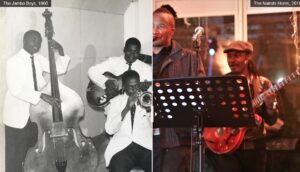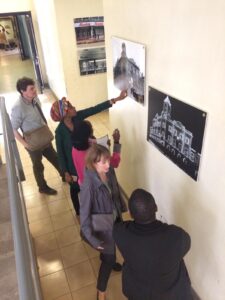Building Shared Futures (BSF) is a collaboration between higher education and heritage partners in the UK and Kenya. Our purpose is to increase access to images documenting the urban heritage of Nairobi and give them new value and meaning for people.
Can you tell us a bit about the project?
Bristol Archives holds many photographs from colonial Kenya, mostly taken by former officials who came back at the time of independence. These are personal items, and so very different to the government records which have faced calls for repatriation.
But we recognise that it’s not acceptable for people in postcolonial countries to lack access to materials on their own history, and we feel a responsibility to find ways of putting this right.

‘Then and now’ picture from Changing Perspectives (1960 image copyright Charles Trotter/ 2019 image copyright Chao Tayiana and Jones Waihenya)
Similar photographs also exist within repositories in Kenya, but without funding and infrastructure they too can’t be made widely available. Many citizens of the former empire came to Britain, and their descendants now form part of diaspora communities which can sometimes lack ways of feeling connected to their family heritage.
What aims did you have, and how did the project pan out?
Our main aims were:
- to empower Nairobi’s citizens to connect around their shared urban heritage, helping to ensure that future development is socially just
- to open up these resources for researchers, creative practitioners and the Kenyan diaspora.
We received funding from the University of Bristol to assemble academics in both countries working on Nairobi’s heritage, alongside museum and archive practitioners. We also met with a wider team of stakeholders in Nairobi, including creative practitioners and community leaders. Our initial phase in 2019 involved:
- workshops in both countries to learn what material we all had, who would benefit from access to it and how we could bring them together
- digitising 2000 of our images selected by Kenyan team members, and developing a pilot site for pinning them to a map, as well as making them available on our online catalogue
- raising awareness of the project and gathering support for the proof of concept
- a simultaneous exhibition in the National Museum of Kenya and Bristol Archives, featuring then and now pictures of Nairobi.
Although only a pilot project, BSF enabled some really positive outcomes:
- making the digitised images available encouraged people to share knowledge about other collections which exist within Kenya, increasing understanding of resources in both countries
- our contacts helped us to reach communities where people are passionate about their heritage but are not generally users of archive services
- the exhibition provided a public showcase to celebrate Nairobi’s history, giving us ideas for how to generate more engagement, such as social media
- the work felt genuinely collaborative, and has informed other co-curated work being undertaken by Bristol Culture. As one workshop participant said, “I’ve been invited along to many groups like this to represent my community – but always at the end. This is the first time a community leader has been part of things from the start.”

Collaborating on exhibition captions at the National Museum of Kenya (copyright Liz Haines)
What did you learn?
We found working with overseas partners hugely valuable. Although our life and work experiences are very different, there are many areas of mutual interest and shared commitment. However, it can’t be stressed enough that genuinely inclusive and decolonial ways of working cannot be rushed or done cheaply, whether in the UK or abroad. It takes time to listen, build trust, accept difference and sometimes have the courage to change direction. Sadly this can conflict with the tendency of many funders to require measurable targets for projects upfront.
What’s next?
We are now looking to the next phase of BSF, and planning to work with some local organisations who are active in community engagement with heritage. This is particularly important to us as we need the work to be sustainable long beyond the initial funded project. As well as more digitisation, we want to develop collaborative ways of cataloguing and also to work with creative practitioners to bring the photos to life.
Moreover, we are keen to trial new ways of working which we could expand to other postcolonial countries and diaspora communities, and help to define and disseminate best practice in this area.
Read more about BSF in this blog post. There is also an online version of our joint exhibition ‘Changing Perspectives: Nairobi Past & Present’.
Nicky Sugar, Archivist (British Empire & Commonwealth Collection), Bristol Archives
